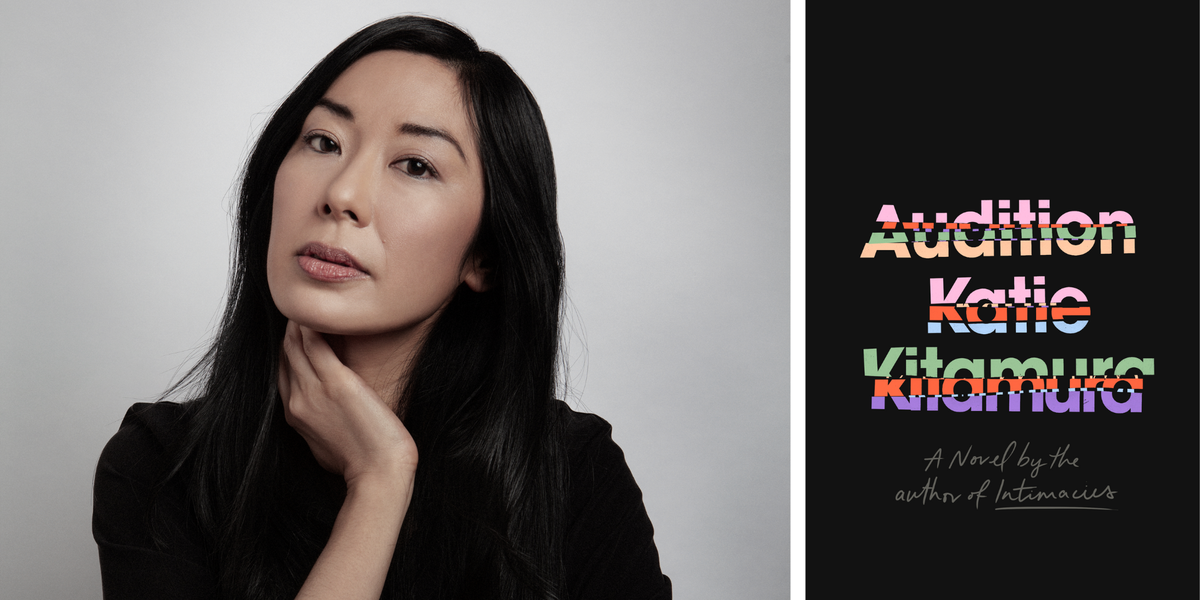
Katie Kitamura Interview: Insights on Writing, Horror, and Art
admin
- 0
In a captivating interview, Katie Kitamura delves into the themes of her latest novel, “Audition,” while reflecting on her experiences as a Guggenheim Fellow in fiction. This engaging literary interview, held shortly before her visit to Harvard, unveils her exploration of performance in literature and the unsettling nuances of middle age. Kitamura’s unique perspective on horror resonates within the context of a family’s dynamics in a cramped New York City apartment. As she discusses the psychological layers of her characters, readers gain insight into her writing process and the influences that shape her work. With an impressive portfolio, including her previous acclaimed novels, Kitamura continues to challenge conventions and redefine the boundaries of storytelling in contemporary fiction.
In this thought-provoking dialogue, acclaimed author Katie Kitamura engages with literary themes that intertwine performance art and the psychological intricacies of human relationships. As she discusses her fifth novel, “Audition,” Kitamura sheds light on the emotional complexities faced by her characters, resonating with audiences who appreciate nuanced narratives. The discussion delves into the essence of narrative construction and how it mirrors the performative aspects of life itself. This interview not only highlights Kitamura’s prowess as a writer but also emphasizes the contemporary relevance of her storytelling in an era marked by uncertainty and introspection. Her insights offer a compelling glimpse into the mind of a writer who seamlessly blends personal experience with broader societal themes.
Exploring Fear Through Performance in Katie Kitamura’s Work
Katie Kitamura’s latest novel, “Audition,” brilliantly intertwines themes of performance and horror, prompting readers to ponder the nature of reality and self-perception. As the protagonist navigates her uncertain life, Kitamura employs performance as a metaphor for the masks we wear daily, reflecting a nuanced understanding of human behavior. This exploration resonates deeply within contemporary literature, where the lines between authenticity and artifice blur, revealing the underlying fears that accompany living under public scrutiny and personal insecurities. By illustrating how the protagonist’s roles shift and change, Kitamura reveals that confronting our fears often begins with acknowledging the performances we put forth.
Moreover, Kitamura’s background as a Guggenheim Fellow underscores her recognition within the literary community, allowing her to delve deeper into themes like performance and identity. In “Audition,” she captures the essence of how familial and social expectations shape our identities, leading to an unsettling exploration of privacy and self-disclosure. The narrative navigates the tension between personal secrets and the performance of domestic life, making it a reflection of modern societal dynamics. Each character’s journey invites readers to examine their perceptions of truth and performance within their own lives.
The Pandemic Influence in Katie Kitamura’s ‘Audition’
Kitamura’s “Audition” emerges as an intriguing reflection on the pandemic, a context in which the novel was conceived. While it lacks direct references to masks or vaccinations, the exploration of confinement within a small apartment mirrors the limitations many faced during lockdowns. The feeling of claustrophobia, both physical and emotional, amplifies the tensions among family members, showcasing how shared spaces can magnify underlying issues and fears. This thematic choice not only highlights the pandemic’s impact on contemporary literature but also signifies how writers like Kitamura have absorbed these experiences to enrich their narratives.
The concept of a “pandemic novel” takes on new meaning when viewed through Kitamura’s lens. By positioning her characters within a context of uncertainty and forced intimacy, she reveals the darker undercurrents of familial relationships. The novel becomes a microcosm of larger societal anxieties, questioning how well we truly know those closest to us when privacy erodes and interactions become charged with tension. Kitamura’s insights underscore the necessity of fiction in articulating complex realities, providing an artistic outlet to process collective experiences of fear and isolation.
Katie Kitamura: Language and the Power of Fiction
Katie Kitamura champions the importance of language in her approach to writing, utilizing it as a tool for connection and understanding. In her literary interviews, she affirms that the act of writing fiction transcends mere storytelling; it represents an essential means of engaging with the world. Kitamura emphasizes that the precision of language holds power, especially in times of societal upheaval. As literary landscapes shift due to technological advancements and changing cultural dynamics, she remains steadfast in her belief that fiction serves not only to reflect reality but also to challenge it, fostering hope for alternative futures.
Through her engagement with students and readers alike, Kitamura encourages a deep appreciation for literature’s role in society. She elucidates that the act of reading fosters connections across diverse experiences, countering fragmentation in an increasingly divided world. For Kitamura, the story is not just about entertainment; it’s a vital expression of human experience that can illuminate the darkest corners of our lives. The significance of the English major, as she asserts, lies in its ability to cultivate critical thinkers who can navigate and shape their realities through the power of words and storytelling.
Performance in Literature: Insights from Katie Kitamura’s ‘Audition’
In ‘Audition’, Katie Kitamura’s exploration of performance extends beyond the stage, delving into the intricacies of human relationships and identity. By using an actress as the central character, Kitamura illustrates how our interactions often resemble performances influenced by social expectations and personal fears. This layering of identity reflects the complexity of human experience, as characters grapple with the various roles they are compelled to play in the different aspects of their lives, including family, career, and society. Kitamura’s nuanced portrayal invites readers to reflect on their own performances, encouraging a deeper understanding of the roles we adopt and the fears that accompany them.
This focus on performance aligns with Kitamura’s broader literary themes, highlighting the fragility of truth in personal connections. In interviews, she discusses how these performances can reveal or conceal the essence of a person’s character. The tension between authenticity and deception becomes a central motif, particularly as characters confront their own limitations and the perceived expectations of those around them. Kitamura masterfully weaves elements of psychological depth and horror, suggesting that the most frightening truths often lie just beneath the surface of our everyday performances.
The Uncanny Elements in Kitamura’s Narratives
Katie Kitamura’s fascination with the uncanny is evident in ‘Audition’, where familiar domestic settings morph into spaces of eerie tension. Drawing parallels to classics like ‘Rosemary’s Baby’, Kitamura explores themes of motherhood and identity through a lens of horror, carefully crafting a narrative that leaves readers questioning the stability of their own perceptions. The uncanny signifies that discomforting moment when reality shifts, urging individuals to confront their fears about the unseen aspects of life and relationships. This thematic engagement not only enriches Kitamura’s storytelling but also connects with broader literary discourses on the nature of fear and the unknown.
Her deliberate choice of the uncanny as a narrative device underscores the complexity of human emotions and relationships. As characters navigate their interrelations within the claustrophobic environment of their apartment, the unsettling atmosphere serves as a mirror to their individual fears and insecurities. Drawing upon the uncanny allows Kitamura to elicit a profound emotional response from her audience, enhancing the psychological depth of her work. By invoking this powerful theme, she challenges readers to embrace discomfort as a catalyst for deeper understanding—both of themselves and the relationships that shape their lives.
The Importance of Privacy in Personal Relationships
In ‘Audition’, Katie Kitamura grapples with the concept of privacy and its significance in intimate relationships. As the protagonists navigate their lives under constant scrutiny, the novel raises poignant questions about the balance between openness and maintaining personal boundaries. Kitamura suggests that while transparency is often idealized, the ability to safeguard parts of oneself is crucial for individual well-being. This tension between knowing and not knowing not only adds a layer of complexity to her characters but also resonates with readers who may struggle with similar dynamics in their own lives.
Kitamura’s perspective on privacy reflects a broader commentary on societal expectations around relationships and intimacy. She advocates for the idea that a healthy relationship can thrive even amid secrets, urging individuals to reconsider their narratives surrounding disclosure. By exploring the bittersweet realities of love, fear, and vulnerability, Kitamura carves a space for readers to reflect on their relationships, challenging the assumption that complete transparency equates to trust. In doing so, she reinforces the argument that maintaining aspects of privacy can enhance rather than diminish our connections with others.
The Role of Fiction in Times of Crisis: Insights from Kitamura
Katie Kitamura eloquently articulates the vital role of fiction amidst times of crisis in her interviews and writings. She emphasizes that storytelling is not merely an escape but a necessary response to the complexities of modern life. Fiction has the capacity to explore uncomfortable truths, offering new perspectives that challenge prevailing narratives—a crucial endeavor particularly in politically charged climates. For Kitamura, the act of writing and reading fiction is empowering, as it invites both the writer and the reader to envision alternative realities and possibilities.
By engaging with the emotional and psychological layers of fiction, Kitamura underscores its transformative power. She encourages audiences to recognize that literature can serve as a pathway to understanding, empathy, and connection among people with diverse experiences. In her own work, including ‘Audition’, she illustrates that engaging with fiction allows us to confront fears and uncertainties, enabling personal and societal growth. As she articulates, the need for fiction, especially in turbulent times, becomes not only a pursuit of meaning but also an assertion of hope for a better future.
Katie Kitamura and the Crisis of Identity in Literature
In ‘Audition’, Kitamura addresses themes surrounding identity and the crises that often accompany it. The central character’s journey reflects a broader exploration of how identities are constructed, negotiated, and sometimes fractured in the face of personal turmoil and societal expectations. Kitamura’s portrayal of identity as fluid rather than fixed resonates particularly in contemporary discourse, where individual experiences of self-understanding frequently encounter external pressures to conform. Her insightful narrative elegantly illustrates that identity is often a performance, shaped by various contexts that can quickly reshape our sense of self.
The tension between personal identity and external perception becomes a central theme, particularly as characters grapple with their roles within familial dynamics. Kitamura’s exploration of this crisis invites readers to engage with their constructed identities, prompting introspection on the pressures of social performance. The notion of identity being inherently adaptable aligns with her fascination with performance in literature, where the boundaries of selfhood are navigated through relationships and societal roles. Through her nuanced storytelling, Kitamura encourages a deeper understanding of the multifaceted nature of identity and its impact on personal agency and authenticity.
The Interplay of Art and Literature in Kitamura’s Work
Katie Kitamura’s work showcases a profound appreciation for the interplay between art and literature, enhancing her narratives with complex layers of meaning. Drawing from her experiences in the arts, Kitamura crafts stories that not only engage the intellect but also evoke emotional resonance through vivid imagery and rich language. This artistic sensibility is evident in ‘Audition’, where she weaves elements of visual art into the fabric of her narrative, inviting readers to envision scenes with an artist’s eye. Her ability to blend different artistic forms enriches her literature, allowing for a multi-dimensional exploration of themes such as identity, performance, and perception.
Kitamura’s engagement with visual art serves as an extension of her narrative voice, emphasizing that literature can be a form of visual storytelling. By incorporating visual elements, she draws parallels between the actions of characters and the static representations often found in paintings, creating a layered reading experience. This interplay highlights the fluidity of narrative and encourages readers to consider how identity and reality are manufactured, both in literature and within the artistic realm. Kitamura effectively bridges the gap between different mediums, demonstrating that the beauty of literature lies in its ability to evoke a myriad of senses and interpretations, making her work all the more impactful.
Frequently Asked Questions
What themes does Katie Kitamura explore in her latest novel and in her interview?
In her latest novel, “Audition,” Katie Kitamura explores themes of performance, identity, and the uncanny aspects of middle age. During her interview, Kitamura discusses how her fascination with horror lends itself to these themes, emphasizing the unsettling nature of familiar relationships and personal secrets. Her works often reflect on the adaptability of identity, particularly through the lens of an actor navigating complex emotional landscapes.
How does Katie Kitamura’s Guggenheim Fellowship influence her writing as discussed in her interview?
In her interview, Katie Kitamura, a 2025 Guggenheim Fellow, notes that this recognition allows her the freedom to explore deeper themes in her writing, particularly in her novel “Audition.” The fellowship supports her artistic endeavors and reinforces the importance of literary exploration during challenging sociopolitical times, as she believes writing fiction is essential for envisioning alternative realities.
What discussion points arise about performance in Katie Kitamura’s literary interview?
In her literary interview, Katie Kitamura highlights the significance of performance in understanding human relationships. She suggests that through observing others’ performances, we learn about ourselves. This exploration of role adaptability and the boundaries of personal privacy are core elements in her novel, “Audition,” where these themes manifest amid a family’s complex dynamics.
Does Katie Kitamura consider her latest work a horror novel during her interview?
Yes, during her interview, Katie Kitamura confirms that her latest work, “Audition,” engages with horror as a genre. She draws parallels between her characters’ psychological tension and classic horror elements, illustrating how the fear of the familiar can evoke a sense of horror, particularly within the confines of a family setting.
What significance does Katie Kitamura place on fiction in contemporary society according to her interview?
In her interview, Katie Kitamura asserts that fiction holds significant power in contemporary society, especially amid political unrest and ecological crises. She emphasizes the role of fiction in bridging connections and envisioning alternative realities, arguing that it is essential for writers and readers to engage with the world through literature.
How does Katie Kitamura’s background as an English major inform her perspectives shared in her interview?
Katie Kitamura’s background as an English major profoundly informs her perspectives, as she discusses during her interview. She values the critical thinking and empathetic connection fostered through literature. Kitamura believes that reading allows individuals to connect deeply with diverse perspectives, reinforcing her advocacy for the importance of literature in today’s fragmented world.
What is the intersection of privacy and performance in Kitamura’s work as highlighted in her interview?
In her interview, Katie Kitamura delves into the intersection of privacy and performance within human relationships. She argues that while performance is fundamental to our social interactions, maintaining a degree of privacy is essential. This tension between public persona and personal secrets is a recurring theme in her novel “Audition,” where characters grapple with their hidden identities.
| Aspect | Details |
|---|---|
| Author | Katie Kitamura |
| Current Work | “Audition”—her fifth novel, exploring horror and midlife themes. |
| Previous Works | Notable novels include “Intimacies” and “A Separation.” |
| Influences | Influenced by works such as “Rosemary’s Baby” and Shirley Jackson’s novels. |
| Themes | Performance, identity, motherhood, privacy, and horror. |
| Perspective on Fiction | Writing fiction is crucial for observing reality and imagining alternatives. |
| Education | English major with a strong advocacy for the value of literature. |
Summary
The Katie Kitamura interview reveals deep insights into the author’s thematic explorations and creative process behind her latest novel, “Audition.” With a focus on horror intertwined with the complexities of midlife, Kitamura sparks discussions about performance and identity. Her assertion of the importance of literature in connecting individuals and envisioning alternative realities resonates strongly in today’s sociopolitical climate, demonstrating her belief in the transformative power of fiction.

